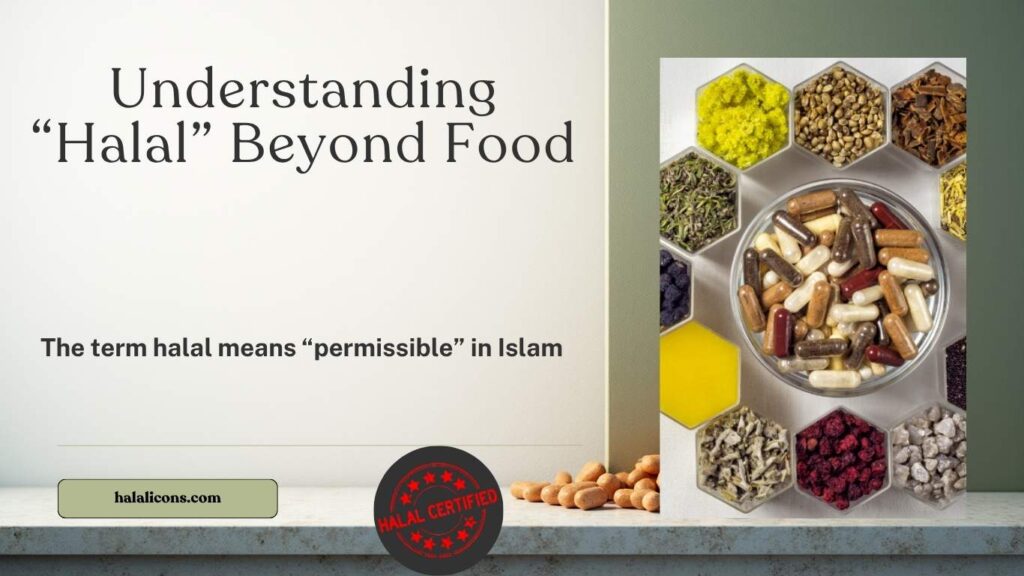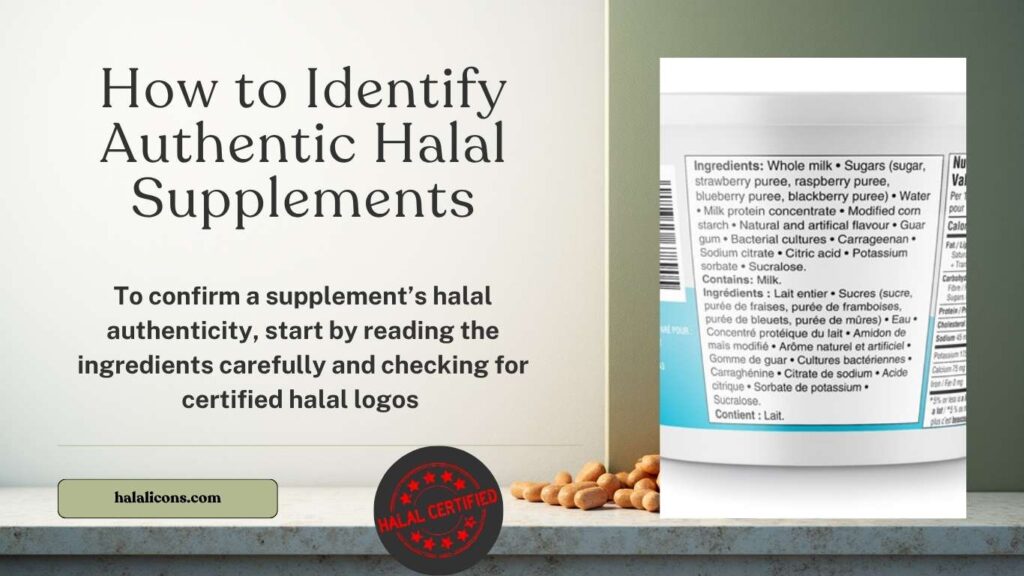Halal supplements are becoming a global trend as more people look for products that align with their health goals and religious values. These supplements follow Islamic dietary laws, ensuring they are free from haram ingredients like pork, alcohol, and non-halal gelatin.
With rising awareness about halal nutrition, Muslim consumers are seeking vitamins, proteins, and herbal products that are both effective and ethically produced. Beyond faith, halal-certified supplements also appeal to non-Muslims who value purity and quality.
This growing demand is reshaping the wellness industry, making halal supplements an important part of modern nutrition and global health standards.
Understanding “Halal” Beyond Food

The term halal means “permissible” in Islam and applies to everything a Muslim consumes or uses, not just food. When it comes to supplements, halal means every ingredient, process, and packaging method follows Islamic law.
It also excludes anything haram (forbidden), such as pork derivatives, alcohol, or animal-based gelatin from non-halal sources.
Another important concept is tayyib, which means pure and wholesome — ensuring the product is safe, clean, and ethically made. This combination of halal and tayyib makes supplements both spiritually and physically beneficial, reflecting a lifestyle focused on purity, transparency, and respect for health.
You might also like: Is Wingstop HALAL or HARAM?
What Makes a Supplement Halal?
A supplement is considered halal when all its ingredients and production processes comply with Islamic dietary laws. This means it must be free from pork, alcohol, or any by-products derived from non-halal animals.
Ingredients like gelatin, glycerin, and stearates must come from plant or halal-certified sources. Even flavorings, colorants, and capsules require careful review to ensure purity. Alcohol used in extraction or flavoring is acceptable only if it completely evaporates during processing.
Manufacturers must also avoid cross-contamination by maintaining dedicated halal production lines. By following these steps, companies ensure that their halal supplements are safe, clean, and suitable for Muslim consumers.
Halal Certification Explained
Halal certification is an official process that confirms a supplement meets Islamic requirements. It involves reviewing raw materials, inspecting production facilities, and ensuring no haram ingredients are used.
Certification bodies like IFANCA, MUI, HFA, SANHA, and JAKIM are recognized worldwide. Each organization has specific criteria, but all focus on purity, transparency, and traceability. Manufacturers must submit documents, undergo audits, and renew certification regularly.
As a consumer, you can verify halal status by checking for a valid logo, certification number, or QR code on the packaging. Choosing halal-certified supplements ensures authenticity, safety, and compliance with faith-based values.
Common Misconceptions About Halal Supplements
Many people believe vegan or organic products are automatically halal — but that’s not always true. Some vegan items may still use alcohol-based flavoring or non-halal processing aids.
Similarly, fish gelatin isn’t always halal unless sourced from properly slaughtered fish. Another misconception is that natural or plant-based equals halal, yet ingredient sourcing and processing still matter—some brands also market products as “halal-friendly” without official certification, which can mislead consumers.
To be truly halal, a supplement must carry a valid certification from a trusted authority. Understanding these differences helps consumers make confident, faith-compliant, and informed choices.
Halal Supplement Market Overview
The global halal supplement market is rapidly expanding, driven by growing Muslim populations and rising demand for ethical health products. Countries like Malaysia, Indonesia, Pakistan, and the U.S. are leading this movement.
Consumers now prefer supplements that combine quality, purity, and religious compliance. Transparency, traceability, and halal certification have become key buying factors. Innovative technologies like blockchain and AI are helping brands ensure ingredient authenticity and build trust.
As more non-Muslims seek clean-label and ethically sourced supplements, halal-certified products are emerging as a universal symbol of purity and wellness in the health industry.
Types of Halal Supplements
Halal supplements cover a wide range of categories designed to support overall wellness. Common options include multivitamins, minerals, and herbal formulas made from plant-based or halal-certified ingredients.
Popular choices like Vitamin D3, B12, and iron are available in gelatin-free capsules. For fitness lovers, halal protein powders and collagen from fish or plant sources offer safe alternatives. Omega-3 and algae oils replace traditional fish oils that may not be halal.
Other trending categories include probiotics, immunity boosters, and women’s health supplements. Each product type ensures Muslim consumers can maintain their health goals while staying fully compliant with halal principles.
How to Identify Authentic Halal Supplements

To confirm a supplement’s halal authenticity, start by reading the ingredients carefully and checking for certified halal logos on the packaging. Look for verification marks from recognized bodies like IFANCA, SANHA, or HFA.
Certified products often include a certification number or QR code you can verify online. Watch out for vague claims such as “halal-friendly” or “made for Muslims” without proof. Also, review the company’s transparency on ingredient sources and manufacturing processes.
Consumers should report fake or misleading labels to certification authorities. Following this checklist helps ensure that your supplements are genuinely halal and trustworthy.
Health & Spiritual Benefits of Choosing Halal Supplements
Halal supplements offer both physical and spiritual benefits. They ensure purity, safety, and ethical sourcing, promoting better health without compromising faith. Since they’re made from clean, high-quality ingredients, they support overall well-being while providing peace of mind.
The tayyib principle ensures supplements are wholesome, natural, and beneficial to the body. Halal-certified products also reflect transparency and trust in manufacturing. For many consumers, choosing halal isn’t just about religion — it’s about embracing integrity, quality, and ethical living.
This balance of health and faith makes halal supplements a meaningful choice for today’s conscious consumers.
Halal Supplement Brands to Watch (2025 Edition)
Several brands are leading the halal wellness movement worldwide. Notable names include NoorVitamins, NutraHalal, and HalalVit, which provide a wide range of certified vitamins and herbal products.
In Pakistan and Malaysia, brands like Marhaba and BioHalal are growing rapidly. Western companies are also joining the trend, offering vegan and plant–based halal–certified options.
Emerging innovations include halal collagen, halal sleep supplements, and halal fitness formulas. These trusted brands are setting new standards for purity and transparency, helping consumers easily find reliable products that align with their faith and health goals.
You might also like: Is L-Glycine Halal or Haram?
Challenges & Opportunities for Manufacturers
Manufacturers face several challenges in producing halal supplements, such as sourcing certified raw materials and preventing cross–contamination. The certification process can be time–consuming and costly, especially for global distribution.
However, the rewards are significant — halal certification opens access to growing Muslim markets worldwide. By investing in traceable supply chains and transparent practices, companies build stronger consumer trust.
Adopting eco–friendly packaging and clean–label strategies also boosts credibility. With rising demand and technological innovation, halal supplement manufacturing presents both a responsibility and a major business opportunity.
FAQs
Q1. Is vegan always halal?
Not always. Vegan products may still use alcohol-based flavoring or non-halal processes.
Q2. Are gelatin capsules haram?
Yes, if made from pork or non-halal animals. Look for plant-based or halal-certified capsules.
Q3. What if a supplement has no halal label?
Avoid it unless the manufacturer provides clear certification details.
Q4. Do halal supplements differ in quality?
Halal supplements often have equal or better quality due to strict purity standards.
Q5. Can non-Muslims use halal supplements?
Absolutely. Many prefer halal products for their clean, ethical production standards.
Conclusion
The demand for halal supplements is transforming the global wellness industry. With more consumers prioritizing purity, transparency, and faith-based values, halal certification has become a trusted symbol of quality.
These supplements not only meet Islamic standards but also promote ethical and sustainable production. Choosing halal–certified products supports both physical well-being and spiritual harmony.
As awareness continues to grow, halal supplements will play a leading role in shaping a cleaner, more responsible health market worldwide.
Qamar Ul Haq is an Islamic historian and writer with a passion for uncovering the rich heritage of Muslim civilizations. Through in-depth research and storytelling, He brings to life the achievements, struggles, and contributions of the Ummah throughout history.